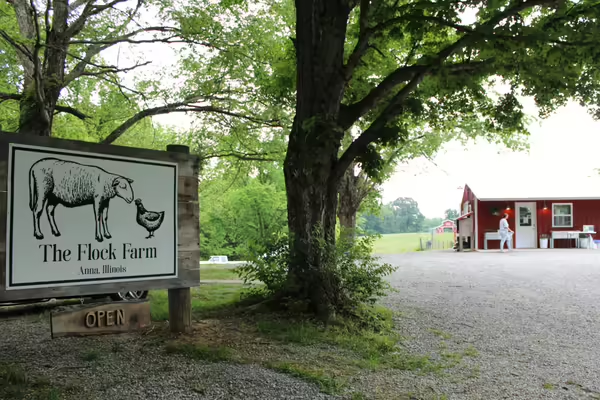
ANNA, Ill. – Thirteen counties, 35 farms, and 10 years of cultivating connections – these are the milestones of the Summer Twilight Series. Designed to bring together farmers, educators, and community members, the series celebrates the innovation and diversity of local agriculture. Now in its 10th season, the 2025 program launched at The Flock Farm – home to southern Illinois’ only poultry processing facility.
Operated by Brent Glays, The Flock Farm specializes in pasture-raised lamb, pork, and poultry. Glays began working as a meat and poultry inspector around the time he was starting his own homestead and small farm. During that time, he became connected with a Mennonite community that gifted him with five lambs, which quickly grew into a 165-head herd.
In 2018, they began to sell meat at the local farmer’s market, but with lamb being a seasonal animal, they needed to supplement to keep the booth open year-round. Poultry was an easy choice, and it took off.
“There would be a line waiting for us at eight in the morning when we pulled into the market, and we would sell out,” said Glays.
The absence of a local poultry processing facility created a significant challenge in meeting demand. With the nearest option located two and a half hours away in Kentucky, Glays was forced to make the lengthy round-trip each month to process 400 chickens. With the majority of their revenue consumed by processing costs, he recognized the need for a more sustainable solution.
Being a meat and poultry inspector by trade, Glays knew what was involved and how to go about it. His vision quickly became a reality when he designed and built his own on-site poultry processing facility, which officially opened in 2024.
Each month, the facility processes approximately 200 chickens raised on the homestead, depending on hatch rates. Committed to sustainability and quality, Glays uses air chilling — avoiding chemical interventions entirely — to maintain greater control over the final product. With an expanded USDA certification, Glays will soon be able to process poultry for other local producers in Illinois, Missouri, and Kentucky.
The Flock Farm’s on-site retail store proudly showcases a variety of local goods — from honey and milk to coffee, meat, and plants — each item reflecting the quality and care of regional producers. The store is open 10 a.m. to 3 p.m., Tuesdays through Fridays, at 460 McDuffee Lane in Anna.
The remaining twilight meetings will feature a different farm or direct-market outlet, showcasing a range of production methods and marketing strategies. Each session includes time for networking, helping local entrepreneurs build valuable partnerships, and strengthening our regional food systems. To register for any of the free programs in the series, visit go.illinois.edu/twilightseries or call 618-695-2441.
If you need a reasonable accommodation to participate in any upcoming events, please contact Bronwyn Aly at baly@illinois.edu. Early requests are strongly encouraged to allow sufficient time to meet your needs.
University of Illinois Extension develops educational programs, extends knowledge, and builds partnerships to support people, communities, and their environments as part of the state's land-grant institution. Extension serves as the leading public outreach effort for University of Illinois Urbana-Champaign and the College of Agricultural, Consumer and Environmental Sciences in all 102 Illinois counties through a network of 27 multi-county units and over 700 staff statewide. Extension’s mission is responsive to eight strategic priorities — community, economy, environment, food and agriculture, health, partnerships, technology and discovery, and workforce excellence — that are served through six program areas — 4-H youth development, agriculture and agribusiness, community and economic development, family and consumer science, integrated health disparities, and natural resources, environment, and energy.